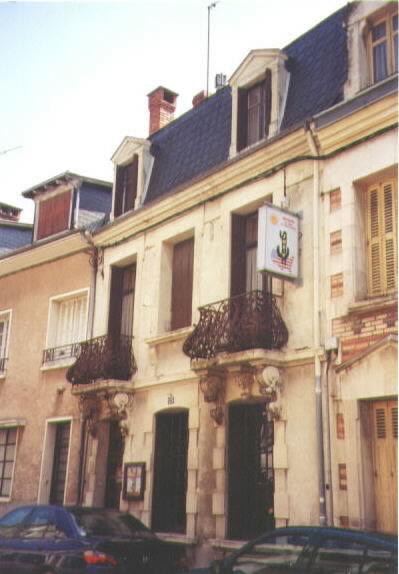
Bar Joe Maine
The vase overflows with pink peonies. Their blowzy heads bend their delicate stems and their scent drifts along, carrying me back to the blue skies, soft breezes and flower gardens of my childhood. Homesickness hits me like a fist. All these years and miles later, Spring flowers fill me with longing. And yet, and yet...
Long ago, when my father’s garden was blooming and filled with the promise of fresh fruits and vegetables, my own head was filled with the desire to leave my native land. Disneyland and New York skyscrapers, Texas ranches and Colorado Rockies, the Grand Canyon and Kansas wheat fields, I could hardly wait to discover all that the United States promised, in movies and in the news, in books and magazines, and in the lyrics of songs. I read books I didn’t understand and listened to records over and over again to learn the English language faster. I wore penny loafers and white socks and shirt-waist dresses and Bermuda shorts and, when a little bit older, I wore pillbox hats, like Jacqueline Kennedy. By the time I was 17, I could pass for an American anywhere, with only a slight accent to betray my origins.
I was helped in my obsession by an American presence in my hometown, in the form of an Air Force base. There were at least two to three American girls in any of my classes at school. GIs could always be found at the bistro my parents managed, more particularly when my pretty cousin tended bar. Later, when my mother got rid of the business and found a job in the hospital on base, I was befriended by the young nurses for whom she made dresses to supplement the family’s income. They became my role models. I was intimated by their easy elegance and their sophisticated ways, but their friendliness and acceptance made me feel that, someday, I could be like them.
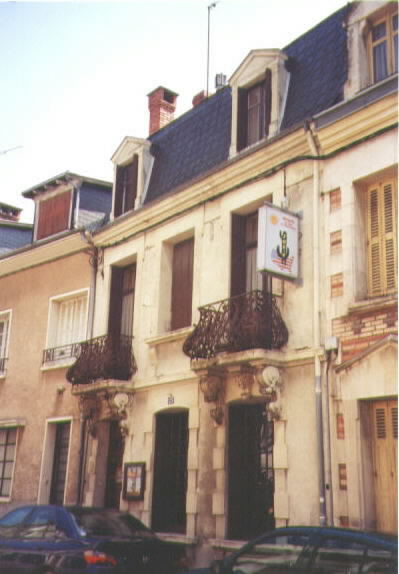
While my peers at the Catholic school I had attended since kindergarten spent most of their evenings doing homework, the French school system was notorious for the amount of work students had on a daily basis and went out in groups, if at all, I skimmed over as much of the homework as I could (except for creative writing) and snuck out of the house to go dancing as soon as my father retired for the night. He had been ill for many years and could not work. My mother worked second shift and arrived home after 11:00 p.m. I would say goodnight and go up to my room, change clothes and come back down the stairs very quietly and let myself out. By 8:00 p.m., I could be found at “Joe from Maine,” my favorite discotheque, mingling with girls who were older and attended a different school, and GIs who liked the place because it was run by an American and his French wife and the atmosphere was decidedly American. In the upstairs bar, Joe and Janine served hamburgers and chili and individual pizzas, all made in a tiny galley kitchen. They even made their own ketchup! Exotic foods to be sure for French people barely out of the hardships caused by four years of German occupation.
At 8:00 p.m. every day, the dance floor opened in the downstairs cellar. The atmosphere was provided by the vaulted ceilings, the dim lighting, the small barrel-top tables and the music pouring forth from the juke box. We danced to American and British rock ‘n roll, to French ballads; we sang along to lyrics that reminded all of us that boys were losing their lives in Asian jungles and that any of the boys on that dance floor could end up there also. Friendships and love affairs formed and dissolved and formed again and bonds were created that have withstood the test of time. For a few hours, the boys forgot they were far from home, the girls forgot about their tedious jobs, and I absorbed a culture that fascinated me. Shortly before 11:00 p.m., like Cinderella, I would leave and run the few blocks to my house to get home before my mother.
Over 50 years later, Joe’s and Janine’s grand-children now run the place. The cellar has long been closed by city ordinance as a fire hazard, but upstairs, real American hamburgers and chili and pizzas are still served to a new generation of French people and to Americans who return occasionally to re-visit their youth.
The friends I made during my teenage years were from all over the United States. The boys were young and homesick and most of them had never been very far from home before. My parents welcomed them into our home and fed them; my mother sewed buttons and fixed seams; and I provided the audience, listening to the description of their town and their family life, cruising down main street on Saturday nights, going to drive-in movies (such a foreign concept!), going to the prom and hoping their best girls would still be waiting when they returned. The girls were military brats who had lived everywhere and were more worldly. A few were American but the others were German, French, Italian and Norwegian, daughters of NATO personnel. I felt very naive and countrified when I was with them. They had traveled the world over and I had never left my small province. Being around them made me more determined to leave.
Upon graduation from business school, I was offered a job on base. I spoke English fluently and had even taken business English so it didn’t seem too daunting. As I typed letters and reports and translated papers for the sergeant in charge of my office, and as I became more familiar with the way the military did business, I started thinking that joining the Air Force might be a good solution to my dilemma: how to go to work in the United States. I knew it was possible, as I babysat for the child of a captain and his wife and the captain was a German national who had joined the American Air Force. However, before I was able to look further into the question, Charles de Gaulle decided to show the Americans the door and the base closed. It is very difficult to describe, and probably harder for an outsider to understand, the impact that the base closure had on the town. There was the loss of more than 3,000 jobs; there was the loss of income from real estate rented to military personnel; there was the loss of income suffered by restaurants and bars and hotels and clothing stores and beauty salons; but, more than that, the closure left a void in the fabric of the town. The Americans had brought with them their positive energy, their sense of adventure, their laughter, their child-like delight in new things, their belief that all was right with the world as long as they were around. When they left, all of it left with them and the town returned to its provincial lethargy. It was to be years before business improved and life returned.
I was devastated by the loss of my friends and found myself with nothing to do. No more bowling, movies, roller-skating, barbecues. Even Joe from Maine felt empty. There was no one left to dance with and my cousin and I stopped going down to the cellar until one weekend when some old friends drove from their new base in Germany. Then others came from England for a few days, and from Spain. They may have moved away but they missed our town, where they had felt welcomed. To this day, they still come, alone or with wives and children in tow. They visit all of their old hangouts and remember their stay with fondness.
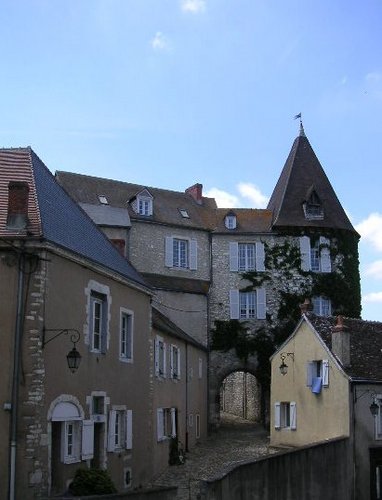
No sooner had the NCO Club, where I worked, closed than my mother found me a different job, as secretary to the director of a commercial retirement fund. While the rate of pay was good for a French business, it was a third less than my previous salary. But much worse than the decrease in pay was the atmosphere of the office where I found myself working. The openness and friendliness of my American co-workers and superiors were replaced by sour faces and strict rules. Only business conversation was allowed, bathroom trips were timed and our manager would listen at the door to make sure we were not chatting. The office was unbearably cold in the winter and too hot in the summer and the work was tedious. After a while, hoping to get fired, I started a mild form of rebellion. I started calling two of my co-workers, who were around my age, by their first name and I stopped whispering when I wanted to say something. One day, after dropping off checks at the bank, which was my duty every Wednesday afternoon, I stopped and bought every one an apple turnover. The director was too stunned to say anything but thank you when I presented him with his, but I hoped I’d get called in and handed my walking papers. It didn’t happen and, each Wednesday thereafter, I brought back a pastry. For my 18th birthday, I brought a strawberry pie and a bottle of Champagne. Again, Tonton Marc, as we called him behind his back, shared in the celebration but did not fire me. The attractive part of working in France is getting one month vacation every year. July of 1967 found me traveling to England to visit my friend Myrtille and her husband who were stationed at Mildenhall Air Force Base, near Ipswich. It was my very first trip entirely alone and it was both scary and exhilarating. It involved a train to Paris, a bus to Orly airport, a flight to London, a cab fare to the train station and a train to Ipswich; I can hardly recall any of it except that I had a bout of air sickness which passed after about 20 minutes, and that the cab driver asked me if I were from New York!!! I don’t even remember if I went through Victoria Station or Paddington. What I do remember clearly, however, is my sense of panic when I arrived in Ipswich, around 7:00 p.m., and my friends were not there to greet me. There were no cell phones then! So I took a cab to their house and knocked vainly on the door. No one answered. Panic increased rapidly. Luckily, the landlady heard me knocking and invited me in to wait for Mimi and Arnie who, apparently, had gone to the beach, thinking I was arriving the next day! After this unsettling beginning, the rest of the trip was excellent and my lifelong love of traveling was born.
Reality reasserted itself when I returned to my boring job, and I planned a trip to Paris to visit the American Embassy to find out if I could, in fact, join the Air Force. But a few days after my return from England, I received a call from a nurse who had worked with my mother and who had been transferred to a base in Germany. There was a position as a medical transcriber in the base hospital and she had immediately thought of me. I knew nothing of medical terms but I quickly agreed to an interview for the following week, bought a train ticket and presented my astounded parents with the news. Although they could have, since I was still only 18 and, therefore, a minor, they did not stop me. As my mother told me much later, they both thought I had no chance of getting the job anyway and I would come home disappointed but resigned.
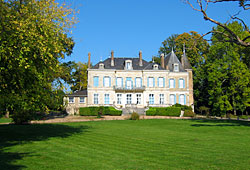
However, four days later, I returned home, employment contract in hand, and determined that I was not going to miss that opportunity. I can still see my parents, sitting at the dining-room table, looking at me and at each other, the stricken look on their faces morphing into anger in my mother and resignation in my father. When she would have spoken, he signaled her to silence, took up a pen and signed the official certificate giving me permission to leave the country and take the job offer. I felt triumphant at that moment. Had I understood that my dad’s signature cut the cord irretrievably and that I would stand on my own ever after, I might have felt less sanguine. Now, I wish I could apologize to these two good people for hurting them so.
So, that September found me in Bitburg, Germany. I remembered being somewhat scared of striking out on my own but the excitement I felt overshadowed my apprehension. Besides, I was not entirely on my own. I reconnected with friends and they took pains to help me out. I stayed with my friend Carol until I found a place of my own, a single room in a family home located at the top of a hill. There was a tiny sink, stove and refrigerator in a corner, a single bed and a wardrobe, and a couch, coffee table and two chairs. The room was large and bright as it had large windows overlooking the town. The bathroom was down the hall and I shared it with the children of the house (how appropriate, considering what a child I was). The rent was reasonable considering my salary. Germany in those days already had direct deposit and direct bill payment which made things much easier for me as I was not accustomed to paying bills. At home, I had given my salary to my mother to cover my room and board and kept only a small amount of pin money. (I found out years later that mom had put my money in a savings account in my name and it came in handy at a time when I needed it the most).
My new job, however, was a little more problematic. I was one of three medical transcribers in a tiny little office next to the hospital administrator’s. The other two were Frenchwomen in their late 20’s who, at first, were not too keen on “babysitting” — as they admitted later — a kid, one who obviously needed help with an unfamiliar terminology. Doctors would dictate physical examinations, lab reports, and surgical procedures and we would type these reports to be included in patient files. The terminology itself was not the most difficult since I had taken four years of Latin, but understanding the words spoken by physicians who spoke very fast was extremely hard.; some doctors were not American and were hard to understand even when one spoke to them face-to-face. After the first couple of days, I could tell my co-workers were annoyed by all of my questions and I cried myself to sleep for over a week, wondering what I was going to do and dreading having to go home with my tail between my legs. One afternoon, as I was turning around to ask yet another question about a tape from a new foreign doctor, I caught one woman mouthing to the other “she’ll never get it” ! It was enough to straighten my spine and vow I would SO get it!!! And get it, I did. And the two women and I became good friends; I am still in touch with one of them.
Socially, I was again spending time with friends from home, John and Dennis, two GIs who had worked with my mother, and Christine and Joelle, two French girls whose father had been a NATO officer. The girls lived in Paris but came to Germany on the train on a regular basis because Joelle was dating John. I made new acquaintances, went dancing, dated casually and had a good time until, one day, I met a young man who decided to sweep me off my feet. He was handsome, charming, funny, loved to read and dance and treated me as though I were a princess. Within a short while, we became engaged and were married in the Spring. His family, also charming, came to our wedding. It should have been a perfect day except that my dad had cancer and was receiving radiation treatments. He was able to give me away but could not attend the reception. And my mother disliked my bridegroom!!! She was so angry with me for marrying him that, although she was the perfect hostess and very kind to his family, she did not help me get dressed and wore all black, including black hose!! That woman knew how to make a statement without saying a word! But I had stars in my eyes and ignored the storm clouds.
We spent a blissful year as newlyweds. We entertained, we went dancing, we laughed, we bought a puppy and planned for our future in a suburb of his hometown, Chicago. I knew quite a bit about the United States, having had to learn about it in geography. I had always pictured myself living somewhere like Los Angeles, in a big house on the ocean, or in a high-rise in New York, but Chicago? Never! It was dark, with rain-swept narrow streets and gun fire erupting from cars, wasn’t it, just like was portrayed in “The Untouchables” ? But I was in love with love and would have lived anywhere.
Anywhere, that is, except in my own Berry, an almost-forgotten province, unassuming, quiet, lacking the splendor of the Loire Valley, the lavender fields of Provence or the glamour of the Côte d’Azur, even its name mostly replaced by the prosaic “le Centre” because of its location in the middle of the country. An independent state during the reign of the Carolingians kings, le Berry became a Duchy , then reverted to the crown in the 14th century; it was divided into two “departements,” Indre and Cher, during the post-revolutionary period. There is history there, but not the kind that attracts hordes of tourists.
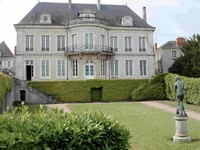
In the last centuries of the first Millenium, the wealthy Abbaye de Deols ruled on one side of the river Indre while, on the other side, the powerful Seigneurs de Raoul built their fortress, Chateau-Raoul, which gave the town of Chateauroux its name; French King Phillipe-Auguste and the Comte de Poitiers, soon to be known as Richard the Lion-Hearted, fought over Chateauroux and Déols which owed their allegiance to the King of England; one of Napoleon’s officers, General Bertrand, made his home in Chateauroux and his house is now a museum; and a textile industry developed along the banks of the river and brought wealth. Now, only stones remain to tell the story of this once royal land. Its green fields and gentle hills are strewn with small castles and manor houses, some in ruins, some still inhabited; cattle graze around farm houses that have stood their ground for several centuries; wisteria curls around fences and blue hydrangeas nod their heavy heads in the shelter of church walls; streams meander and forests shelter ferns and mushrooms and Lily of the Valley; it is the land of la Valley Noire described by Aurore Dupin, better known as George Sand, the writer who numbered among her friends and lovers Chopin, Musset, Balzac and others; it is the land where I go back, to find peace and inspiration, in the lanes and fields my family worked for several centuries, and in the villages where names on tombstones remind me that I belong somewhere after all.
On April 3, 1969, as the plane banked in preparation for landing, the ground beneath became visible from my window. The day was clear and the waters of Lake Michigan shimmered under the afternoon sun. Buildings appeared along the coast, and as we turned towards the airport, islands of pale green started to appear here and there between blocks of houses neatly lined along a grid of streets. Cars sped along roads that unfurled like ribbons under the aircraft’s fuselage. From the sky, the city appeared very clean and well organized, a place where nothing bad could ever happen, not at all like in my previous imaginings. After a smooth landing, we slowly taxied toward the gates. Within minutes, my feet touched the ground of my new homeland and I stepped into a destiny of my own making, hardship and loneliness yet unimagined.
Jacqueline Van Fossan was born Jacqueline Thuault in Chateauroux, France, and has lived in the U.S. for 40 years, 38 of which have been in a Chicago suburb.
